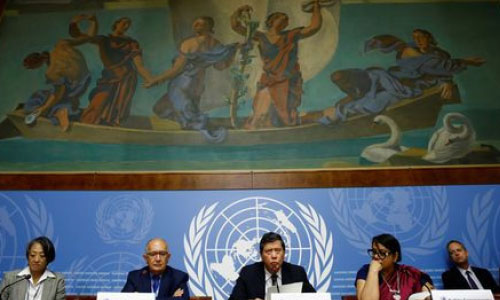GENEVA - Myanmar’s military carried out mass killings and gang rapes of Muslim Rohingya with “genocidal intent” and the commander-in-chief and five generals should be prosecuted for the gravest crimes under international law, U.N. investigators said.
In a report, they called for the U.N. Security Council to set up an ad hoc tribunal to try suspects or refer them to the International Criminal Court in the Hague. The Security Council should also impose an arms embargo on Myanmar and targeted sanctions against individuals most responsible for crimes.
They blamed the country’s de facto civilian leader, Nobel Peace Prize winner Aung San Suu Kyi, for failing to use her “moral authority” to protect civilians. Her government “contributed to the commission of atrocity crimes” by letting hate speech thrive, destroying documents and failing to shield minorities from crimes against humanity and war crimes.
The report also criticized Facebook for allowing the world’s biggest social media network to be used to incite violence and hatred. Facebook responded on Monday by announcing that it was blocking 20 Myanmar officials and organizations found by the U.N. panel to have “committed or enabled serious human rights abuses”.
Contacted by phone, Myanmar military spokesman Major General Tun Tun Nyi said he could not immediately comment. The Myanmar government was sent an advance copy of the U.N. report in line with standard practice.
Zaw Htay, spokesman for Suu Kyi’s government, could not immediately be reached for comment. Reuters was also unable to contact the six generals named in the report.
A year ago, government troops led a brutal crackdown in Myanmar’s Rakhine state in response to attacks by the Arakan Rohingya Salvation Army (ARSA) on 30 Myanmar police posts and a military base. Some 700,000 Rohingya fled the crackdown and most are now living in refugee camps in neighboring Bangladesh.
The U.N. report said the military action, which included the torching of villages, was “grossly disproportionate to actual security threats”. (Reuters)
Home » World » Myanmar Generals Had ‘Genocidal Intent’ against Rohingya, Must Face Justice: U.N.
Myanmar Generals Had ‘Genocidal Intent’ against Rohingya, Must Face Justice: U.N.

